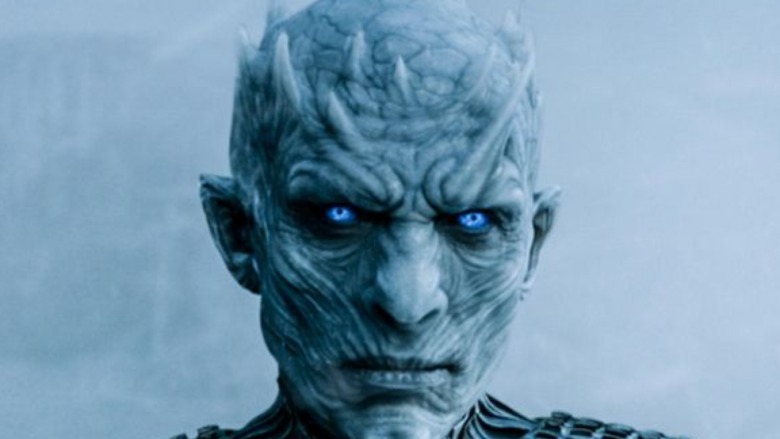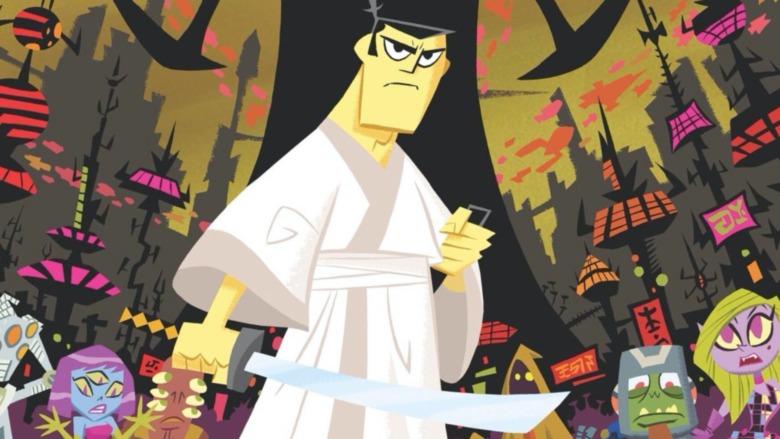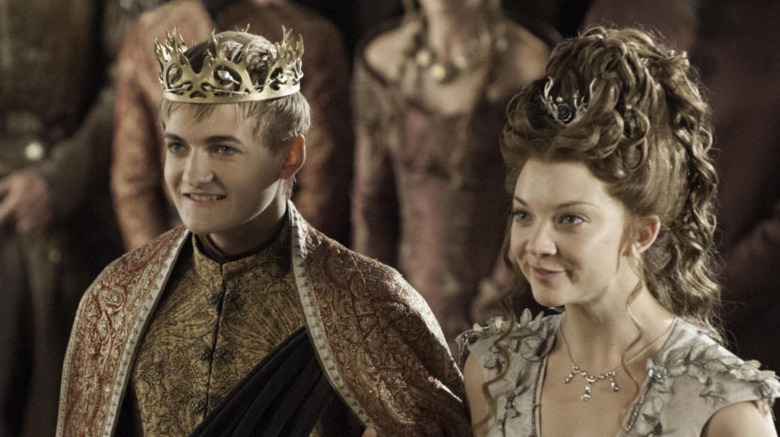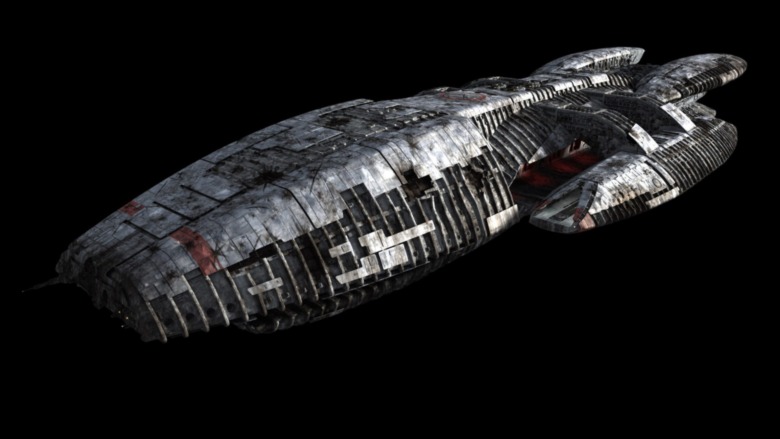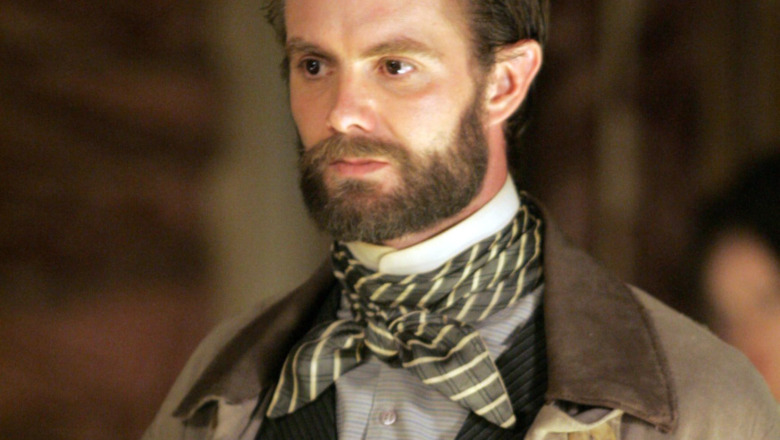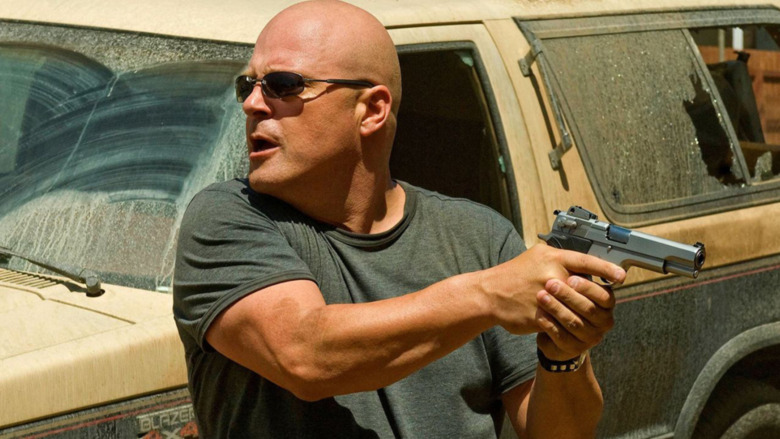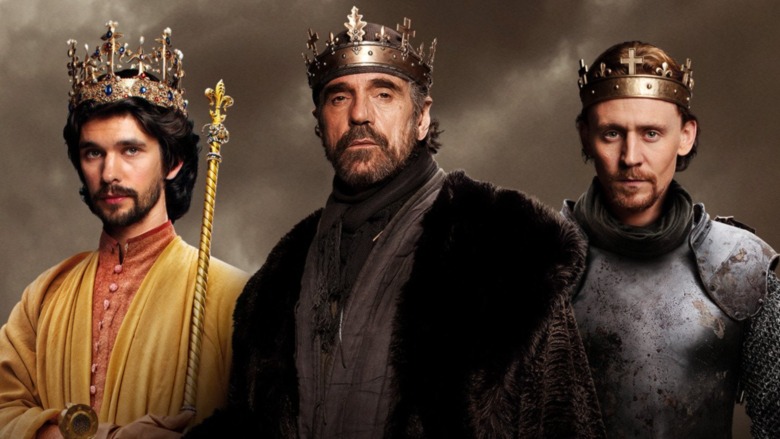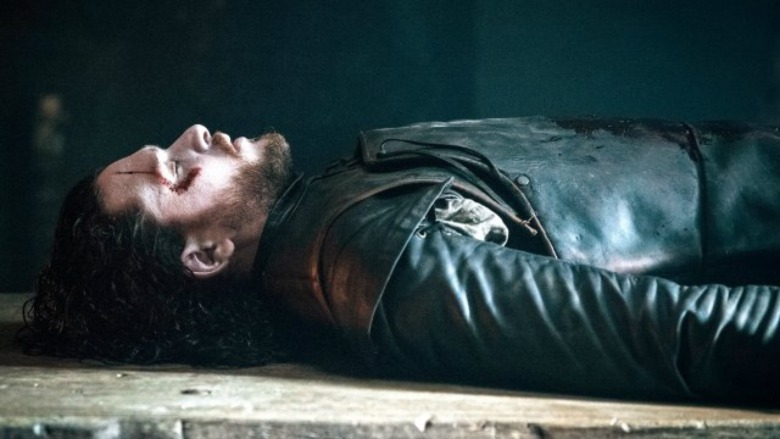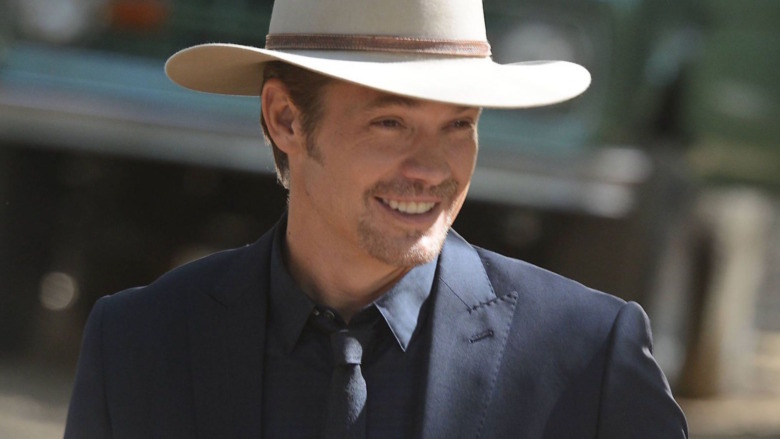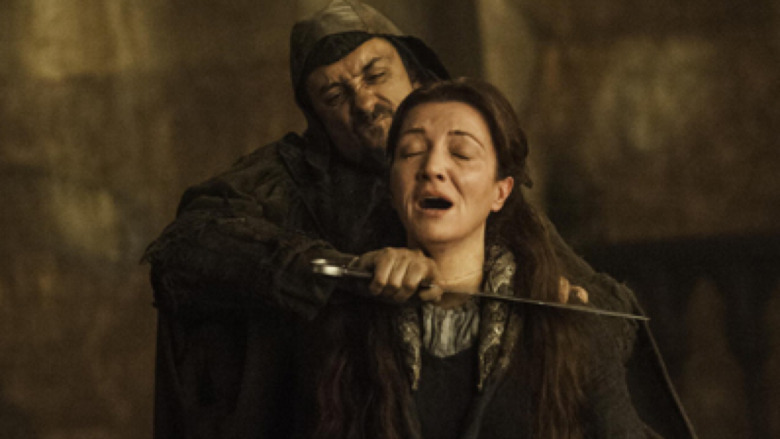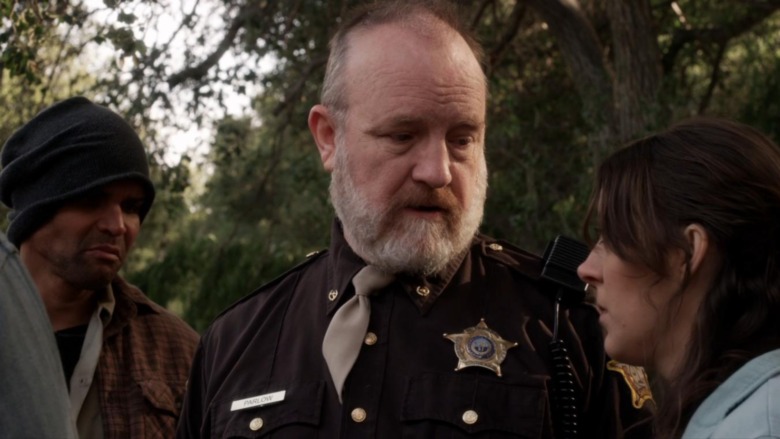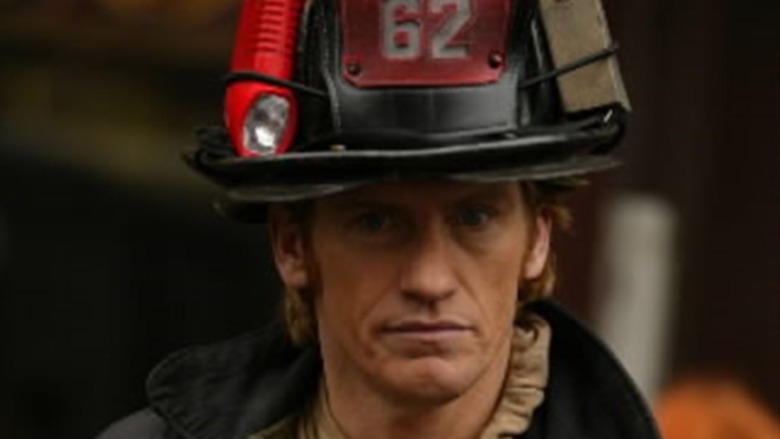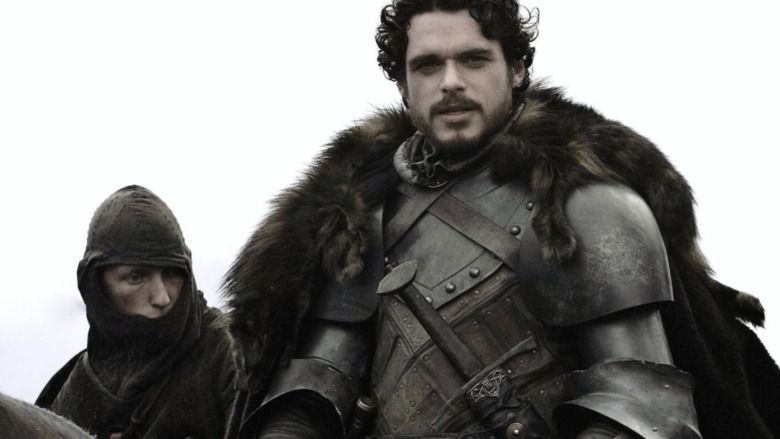There Are Only 13 Near-Perfect Action TV Shows According To Metacritic
Fans of high-quality action television have to be riding high these days, as the streaming revolution of the past several years has ensured that a plethora of intense, action-heavy, exceptional series are always just one "play" button away.
From HBO to AMC, Netflix to FX, it seems like every network has been striving to offer action TV shows that are dramatically rich, intellectually complex, and have cinema-grade levels of action. But, where to start?
Metacritic is happy to be your guide. Using a weighted average ("Metascore") of aggregated critical reviews, it's a trusted authority when it comes to pointing you towards what's worth watching. Per the site's point system, any series that scores above an 81 has achieved "universal acclaim," making those with a score of 90 and above as close to a consensus of "perfect" as you can get.
Of course, every television series has its highs and sometimes lows (unless your name is "Breaking Bad"), but a number of series have seasons that are outright fantastic... dare we say, near-perfect. Using their Metascores for criteria, here are the classic TV seasons that were not merely when these shows were at their best, but rather were at everyone's best. These are the action TV series that achieved near-perfection (and the seasons that were their most flawless).
"Samurai Jack" (Season 5)
Created for Cartoon Network by Genndy Tartakovsky, "Samurai Jack" followed a samurai prince armed with a magic katana capable of cutting... well, pretty much anything. After his kingdom was taken over by the shapeshifting demon Aku, and just before Jack was near triumph, he was sent forward by the demon into a dystopian future. His quest became returning to his own time and defeating the entity before its takeover was complete.
The series initially ran for four seasons between 2001 and 2004, and Adult Swim revived the series in 2017 for a final fifth season... and that season is pretty much a masterpiece.
Taking place 50 years after Jack was sent to the future, we see the samurai warrior ageless from his supernatural time travel but haunted by hallucinations. He has lost his mystical sword, is at his lowest point and almost suicidal from an ageless 5 decades of futile combat.
Season 5 is dark, yet in the midst of abject despair Jack finds a new inspiration, a renewed life, and a capacity to fight again. It's an intense season with a fulfilling, emotionally complex, and action-packed ending that serves as the perfect conclusion to a classic animated action series. Clearly, others agree, as Metacritic gives it a 93 Metascore.
"Game of Thrones" (Season 4)
HBO's "Game of Thrones," based on a series of fantasy novels by author George R.R. Martin, follows the struggles for power of a series of noble families on the fictional continent of Westeros (each vying for rulership following the death of King Robert Baratheon). The central protagonists are the members of House Stark, who spend much of the series fleeing the aftermath of the beheading of their father Ned Stark (Sean Bean) and the wrath of House Lannister, who hold the throne.
Season 4 begins with the melting and reforging of House Stark's ancestral Valyrian steel sword, a symbol of the Lannister's near-destruction of the house following the murder of Robb Stark (Richard Madden) at the "red wedding."
From the wedding of King Joffrey (Raymond Griffiths) and Margaery Tyrell (Natalie Dormer) to Joffrey's death to the massive "Free Folk" assault at The Wall while Daenerys Targaryen (Emilia Clarke) builds her forces — including three growing dragons — it all feels like GOT's greatest hits. The season ends with the shocking death of Tywin Lannister (Charles Dance), the mastermind behind the family's rise to prominence, ending a tumultuous season with yet another change in fortunes. It was a truly shocking season, filled with monumental events that would change the course of the show, showcasing some of the series' best writing — which may be why the Metascore is a "must watch" at 86.
"Battlestar Galactica" (Season 3)
The "Battlestar Galactica" reimagining of the early 2000s became an unlikely phenomenon, thrilling both audiences and critics.
Loosely based on the 1978 series of the same name, "Galactica" is a military science fiction series set in a distant star system, focused on a spacefaring federation from a set of planets known collectively as the Twelve Colonies of Kobol. The technologically-advanced humans there had long ago created a race of androids, Cylons, with whom they had gone to war. The events of the series are set in motion when the Cylons launch a sneak attack on the Colonies, killing the vast majority of the human population.
The masterful Season 3 sees the survivors, now settled in a colony on a planet named New Caprica, contending with the occupation of New Caprica by a Cylon force. A puppet government, led by Gaius Balthar (James Calls) provides the interface between Cylons and humanity, while a burgeoning resistance movement grows. The Battlestar Galactica achieves a daring rescue of the subjugated colonists, and the rest of the season sees significant action, worldbuilding, and events with complex political implications — for instance, what should be done to those who "collaborated" with their Cylon oppressors?
At its best, "Galactica" married excellent action sequences with top-tier drama, and deeper explorations of moral, social, and political questions than most shows would dare attempt. That daring attitude, and the prowess that pulled it off, puts the series at an 89 Metascore.
"Deadwood" (Season 2)
Set in the 1870s in a town called Deadwood, South Dakota, David Milch's "Deadwood" was a revelation from its first episode. Never before had a Western looked, felt or sounded like this before.
The series is about a town that began as an illegal settlement outside U.S. law. As ex Marshall Seth Bullock (Timothy Olyphant) relocated to Deadwood to start a business, Season 1 chronicled the machinations of Saloon owner Al Swearengen (Ian McShane), his increasing conflicts with Bullock, and the town's growing pains, culminating in Bullock becoming the sheriff of Deadwood at the end of the 1st season.
Season 2 brought increasing pressures in Bullock's life, as his relationship with widow Alma Garrett (Molly Parker) came under increased scrutiny upon his wife and step son's arrival in Deadwood. Tensions between Bullock and Swearengen were at a head, and things got only worse as geologist Francis Wolcott (Garret Dillahunt) arrived, introducing further complexity and chaos with his propensity for sexual violence, including the murders of several prostitutes.
It's a tense season of a great show at its peak (with an 85 Metascore), showing the true depravity that could exist in the darker corners of frontier life.
"The Shield" (Season 1)
The FX series "The Shield" was a breakthrough in feel, tone and anti-heroism, following a bastion of corrupt cops as they navigate the slippery slopes of justifying their actions.
2002's Season 1 introduced new Captain David Aceveda (Benito Martinez), who wanted to investigate the Strike Team and their leader Detective Vic Mackey (Michael Chiklis, his Emmy-winning role) for their involvement in more illegal activities than Napster.
Featuring a powerhouse supporting cast that included Jay Karnes (as Wagenbach), CCH Pounder (as the no-nonsense Claudette) and the breakthrough work of Walton Goggins (as over-loyal attack dog Shane Vendrell), "The Shield" was an exceptional series, and for years its pilot episode — which concludes with Mackey killing a cop in cold blood — was considered among the best ever produced.
The powerhouse first season sets in motion many of the major dynamics that informed the rest of this classic series, making it a no-brainer for one of the best seasons ever of an action TV show. On Metacritic, it rests at a lofty 89 rating.
The Hollow Crown (Series 1)
"The Hollow Crown", whose first cycle is an adaptation of Shakespeare's second "Henriad" tetralogy, had one thing going for it from moment one: it's based on some of the greatest storytelling in the Western canon.
The series begins with King Richard, called in to settle a dispute between his cousin Henry Bolingbroke and Thomas Mowbray. Chided by Henry's father, John of Gaunt, he seizes Gaunt's property before leaving for war. Bolingbroke returns with allies, takes Richard prisoner, and claims the throne.
Rebellions escalate and challenge the now dying king's rule, until they're finally overcome, bringing Henry peace and reconciliation with his son. Finally, in Henry V. we see the latter (now king Henry V) enthroned, but facing a challenge from without: war drums from France. Henry prepares to lead his armies across the channel to meet the enemy at Agincourt.
It doesn't really get better than Shakespeare, with fine drama, epic action, and beautiful dialogue. This BBC production brought it all to life with exceptional performances, stunning cinematography, and well executed adaptations overall, making it worthy of its 89 rating.
"Game of Thrones" (Season 5)
Remember how shocked we all were when Jon Snow got stabbed — repeatedly, by his own men — leaving the show's closest thing to a hero lying in bloody heap? Yup, that was Season 5.
This pivotal GOT season also gave us The High Sparrow (Jonathan Pryce), the Faith Militant, the arrest of Margaery Tyrell's homosexual brother Loras Tyrell (Finn Jones) and Cersei's imprisonment and subsequent walk of atonement. Shame, shame, indeed.
Season 5 was also notoriously once again unkind to anyone associated with House Stark. Arya (Maisie Williams) fared best, training to become a "Faceless Man" while Sansa (Sophie Turner) suffered through her time with the evil Ramsay Bolton (Iwan Rheon).
North of the wall, Jon Snow was elected Lord Commander of the Night's Watch, pursued a controversial alliance with the "Free Folk" to combat the emergent threat of the White Walkers, and we finally saw the awesome might of the Night King and his forces. Then it all ended with our hero Jon dead — or was he?
Filled with monumental challenges, betrayals, and epic battles, Season 5 is remembered as one of its best.
"Justified" (Season 2)
Developed by Graham Yost from Elmore Leonard's Raylan Givens' stories, the Kentucky-set "Justified" told the story of Givens (Timothy Olyphant), a dedicated U.S. Marshal whose approach to justice (shall we say) bends the rules.
Season 2 had Givens struggling to deal with the Bennett clan's criminal enterprises. With meth kingpin Bo Crowder dead, the Bennetts intended to expand their marijuana business into Crowder territory, resulting in antagonism between the criminal clans.
The season's standout drama was further amplified by the reveal of a deep-seated antagonism between the Bennetts and Givens, in a season strong with excellent performances, loads of action, and intriguing worldbuilding that considerably expanded our understanding of Givens' family history in the region.
Still a beloved series more than a half-decade after it went off the air, "Justified" didn't get enormous ratings, but did have loyal fans who sang its praises whenever they could. The series sits at a lofty 86 rating, and it doesn't get any better than Season 2.
"Game of Thrones" (Season 3)
There's a reason why "Game of Thrones" keeps appearing on this list, even if the controversial last season made us forget: it was a really good show!
Season 3 had Westeros still beset by civil war between the various factions demanding the coveted Iron Throne. We saw Jon Snow meeting Free Folk leader Mance Rayder (Ciaran Hinds), his romance with Ygritte (Rose Leslie), and Bran's quest to meet the 'Three-eyed Raven', the central thread of his character arc.
The Starks overall fared quite poorly, with a number of Robb's tactical failures coming back to bite him. But most memorably, the season gave us a horrifying sequence that would come to be known as "The Red Wedding." The Starks (including Robb, his bride, and Catelyn) were warmly welcomed, then roundly massacred in a huge victory for the Lannisters. Finally, Daenerys made perhaps the best acquisition for her army other than dragons in gaining the infamous eunuch slave soldiers known as the Unsullied.
These events and many more came into play in Season 3, one of the most eventful and heartbreaking of the entire series — and that's saying a lot.
The Expanse (Season 4)
Sci-fi action series The Expanse took place hundreds of years in the future, after humanity had colonized the Solar System. Over time, this had resulted in a series of powerful factions: the United Nations of Earth and Luna, the Martian Congressional Republic (based on Mars, of course), and the Outer Planets Alliance, comprised of the colonies around the asteroid belt and the moons of Jupiter and Saturn.
While earlier seasons had explored the increasing tension between the factions, everything changed in Season 4. Interstellar travel to thousands of new worlds, conflicts between factions more tense than ever, all while Earth's United Nations and the Martian Parliament maintained a blockade of the dangerous wormhole.
After the UN charters a colony ship to Ilus, refusing to recognize Belter sovereignty (and naming the newly discovered planet "New Terra," the ship's landing is sabotaged, causing loss of lives and escalating tensions even further. As the situation on Ilus worsened, the ship Rocinante arrived in the midst of the conflict. A series of ancient, long dormant alien structures on the planet began to awaken and malfunction, causing a massive tsunami.
Meanwhile, an Outer Planets Alliance pirate named Marco Inaros (Keon Alexander) was unsuccessfully hunted by the UN over the season, before it was revealed that he had plans for a potentially devastating attack against Earth. It was a thrilling end to the excellent Season 4, and a 72 rating cements The Expanse as one of the best sci-fi action series in recent memory.
"Justified" (Season 4)
Season 4 of "Justified" had Givens investigating a 30 year old case of potentially fraudulent activity. Waldo Truth, the patriarch of the Truth family, had been cashing disability checks for 30 years despite the Marshalls believing him to be long dead, meaning someone else was behind the crime.
We gradually discovered the crux of the mystery over the course of the season. Drew Thompson joined the Tonin Crime Family, but events caused him to go on the run and hide from the Tonins. Drew conspired with Waldo Truth, who agreed to die in Drew's place (thus Drew faked his own death), and Drew proceeded to live as 'Shelby Parlow' to hide his identity. Waldo's parachuted body was found and made to appear to be Drew, and a man named Harold Shawn pretended to be the real Waldo Truth in order to continue providing the Truth family with their disability check income (keeping up the appearance that Waldo Truth was indeed alive).
It's an interesting criminal conspiracy that reveals a lot about crime history in the Justified world, and an exceptional season of action-heavy TV.
"Rescue Me" (Season 3)
"Rescue Me" was a beloved FX series that highlighted the exploits of New York City firefighters, starring Denis Leary.
Leary played Tommy Galvin, plagued by guilt over the firefighter friends he lost in 9/11, as well as by dreams of his cousin and best friend Jimmy, a firefighter also lost in the terrorist attacks. While all the seasons are admirably developed entries that hinge on one of the most emotionally complex moments in recent American memory, the series hit its biggest strides in Season 3.
Tommy's on-again-off-again relationship with his wife Janet (Andrea Roth) came to a head in Season 3 via her affair with his brother Johnny, as did a later scene where he forced himself on her, highlighting the instability of the character. The season continued to escalate via Johnny's death as well as the roofie-slipping Sheila's fire that nearly kills them both. It's a tense season with a number of controversial aspects, but they came together to result in a well-received season full of exceptional drama, as evidenced by Metacritic's 85 rating.
"Game of Thrones" (Season 2)
How else could we end this list except with more "Game of Thrones"?
Season 2 was still reeling from the death of Ned Stark, resulting in the scattering of the Stark family across Westeros (in an attempt to evade Cersei Lannister, King Robert's vicious and scheming widow), and sparking The War of Five Kings — the long series of military conflicts between competing noble factions over the rulership of Westeros.
A number of monumental events happened throughout the second season, including Robb's military victories against the Lannisters and crowning as King of the North, Joffrey's abuse of Sansa, Renly and Stannis Baratheon's early attempts to lay claim to the Iron Throne, and Theon Greyjoy's move to capture the Stark's home of Winterfell.
Meanwhile, Daenerys Targaryen (of the House Targaryen whose rule Robert Baratheon had deposed) was seeking to rebuild her family's power in neighboring Essos with three growing dragons under her command. The result was a harrowing season that demonstrated the growing political chaos of Westeros, and signaled a number of the inevitable conflicts to come along in other top-rated season of the show.
